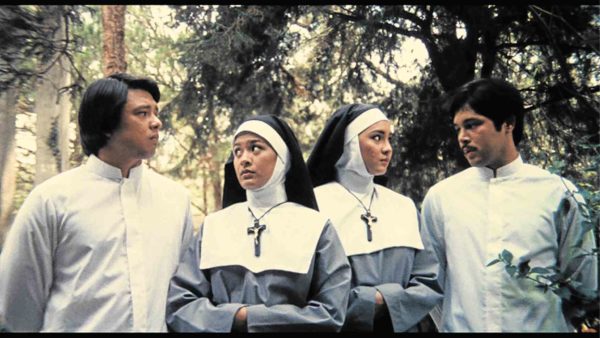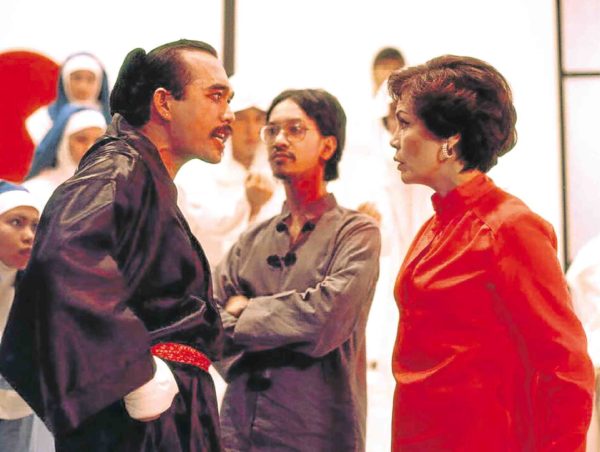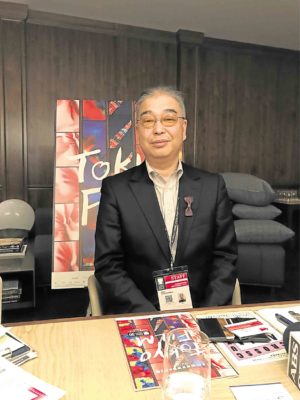‘Kakabakaba’ returns to Japan

In “Kakabakaba Ka Ba?” (from left): Jay Ilagan, Sandy Andolong, Charo Santos and Christopher de Leon
TOKYO—The irony is surely not lost on even the most casual observers.
The digitally restored version of Mike de Leon’s 1980 musical-comedy “Kakabakaba Ka Ba?” found its way back to Japan—where it was part of the Cross Cut Asia program of the 30th Tokyo International Film Festival.
For the uninitiated, the choice could be deemed unusual, if not controversial, considering that the Filipino film features a bumbling Japanese gangster (played by the hilarious Boboy Garovillo) as its main antagonist.
Kenji Ishizaka, program director of the Cross Cut Asia section, has a different take on the matter, however. He recalled that he had seen “Kakabakaba” in 1991. “I loved it! I was then with the Japan Foundation. When we mounted a Filipino film festival, it was one of the movies I chose.”
When he learned that a digitally restored version (courtesy of the ABS-CBN Film Archives) of “Kakabakaba” was now available, he wasted no time in including it in this year’s program.
The fact that it takes satirical jabs at everyone—the Japanese, the Chinese, the Catholic Church and, yes, the Filipino—isn’t a deal-breaker at all.
“First of all, it’s a high-quality musical,” Ishizaka explained. “To look at your own country, through an outsider’s point of view, is always interesting. The Yakuza character is depicted in a caricaturish manner, but that’s good for us to see. It’s a comedy … It’s very funny.”

Johnny Delgado (left) and Armida Siguion-Reyna (right) in “Kakabakaba Ka Ba?”
De Leon wrote on the Facebook page of his new film “Citizen Jake”: “Strangely enough, it was only in the wild and surreal ‘Kakabakaba Ka Ba?’ that I discovered the power of satire and protest (masquerading as comedy) … What if Japanese technology, drugs and the Catholic Church were mixed in together, revealing another theme that eventually turned into an obsession—the futility of organized religion or religion in general.”
Ishizaka felt strongly about including De Leon’s film in the fest so that younger generations could view it as well. After all, festival programmers should also make sure that today’s film buffs are acquainted with the region’s rich cinematic heritage.
In the Cross Cut Asia souvenir program, Ishizaka had an engrossing interview with archivist Tadao Sato of the Fukuoka International Film Festival.
Ishizaka told the Inquirer that in Fukuoka, the organizers were allowed to keep copies of the films shown in the festival for archiving.
“This program has been done for the last 20 years or so,” he explained. “They built an archive, along with the festival. Now, they have so many movies in their collection—including Filipino films from the 1950s that you cannot find elsewhere.”
Included in the Fukuoka archives are such gems as Gerry de Leon’s “Noli Me Tangere” and Mario O’Hara’s “Tatlong Taong Walang Diyos.”
“It’s an admirable initiative,” he related.
“It was made possible because the festival is funded by the city of Fukuoka. Now, the question is, since most of today’s films are on digital: How do we archive them? What does it mean to archive the physical film? That is the new topic that we need to discuss now.”

Kenji Ishizaka —Bayani San Diego Jr.
Apart from “Kakabakaba,” there was another Filipino musical in this year’s Tokyo fest, Loy Arcenas’ “Ang Larawan,” in the Asian Future section.
Ishizaka said that he was familiar with the musical gifts of Filipino artists. “I saw the stage musicals, ‘Noli Me Tangere’ and ‘El Filibusterismo,’ during their Japan tour in the 1990s.” Both musicals, which were composed by Ryan Cayabyab (the same man behind “Larawan”), were brought to different Japanese cities, through the efforts of Yuki Hata of the Japan Foundation.
“If you look at the Filipino films in the lineup, it shows diversity in themes and stories,” Ishizaka noted. “It reflects issues that are considered important in the world.”














